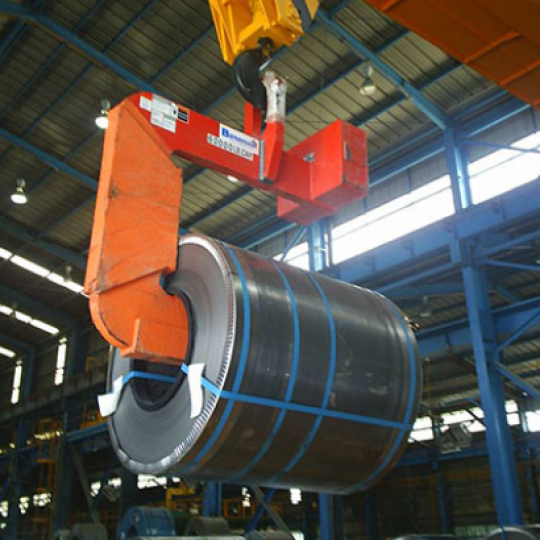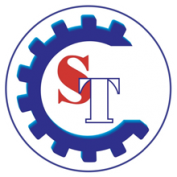- Email: st@cokhisontung.com.vn
- Hotline: 0913 602 660
- Website: gaungoam.vn
Móc cẩu chữ C (C Hook)
Móc cẩu chữ C (C Hook)
-
Liên hệ
-
1052
Móc cẩu chữ C được sử dụng để nâng hạ tôn cuộn, cuộn thép, cuộn giấy, cuộn cao su,... có đường kính ngoài đến 20000m, đường kính trong đến 700mm và tải trọng đến 35 tấn. Móc chữ C có thiết kế tùy chỉnh để đáp ứng yêu cầu cụ thể của khách hàng về chất liệu của cuộn, đường kính cuộn, tải trọng, khoảng nâng hạ. Ngoài ra, móc chữ C còn được điều chỉnh thiết kế để phù hợp với cầu trục, cổng trục, cổng trục giàn nhằm nâng cao hiệu quả sử dụng móc. Cùng Gầu Ngoạm Sơn Tùng tham khảo bài viết dưới đây để tìm hiểu kỹ hơn về loại thiết bị này nhé!
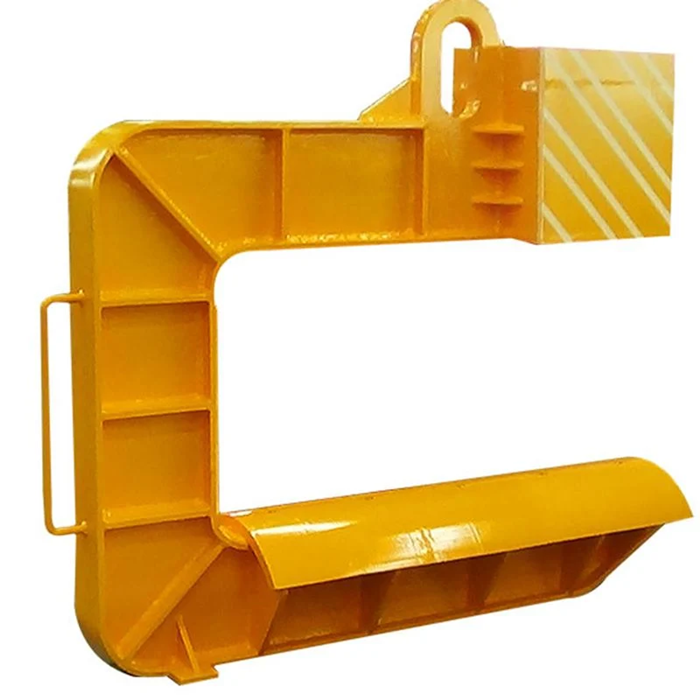
Cơ khí Sơn Tùng chuyên cung cấp móc chữ C chất lượng cao
Mô tả đặc điểm móc chữ C
Móc chữ C được thiết kế bán kính cong với đệm bảo vệ và động cơ xoay để khi nâng/hạ cuộn tôn không bị lõm hay xước. Móc chữ C có thể có đối trọng nhằm đảm bảo cân bằng trọng tâm vật nâng và móc nâng trên đường thẳng.
Móc cẩu chữ C là một trong những thiết bị đặc biệt được sử dụng để nâng/hạ các cuộn tôn (tôn cuộn) có kích thước và tải trọng lớn. Móc cẩu chữ C 6 tấn, 10 tấn, 15 tấn nâng/hạ các cuộn tôn tải trọng từ 15 tấn trở xuống với khổ tôn từ 01 mét đến 1.4 mét.
Cấu tạo móc cẩu chữ C, bao gồm:
- Thân móc cẩu có dạng chữ C hoặc U với mặt cắt dạng hộp.
- Đối trọng của móc cẩu.
- Tai móc cẩu.
- Lớp cao su giữa móc cẩu ở thành dưới mặt trên để tạo bán kính cong, giảm xóc khi tiếp xúc.
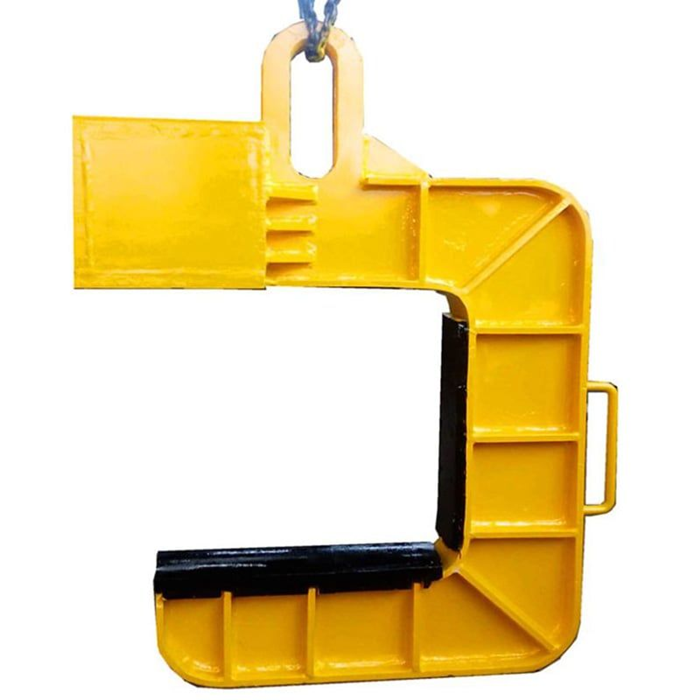
Mô tả một số đặc điểm tổng quan của móc chữ C
Đặc điểm quan trọng nhất của móc cẩu chữ C là khả năng cân bằng khi không có tải hoặc có tải.
Vật liệu làm móc chữ C: Thường được làm bằng thép chuyên dụng dành cho các thiết bị nâng như: Q235 Trung Quốc, SS400 của nhật hoặc tương đương, đặc biệt móc cẩu có thiết kế tiêu chuẩn TCVN 4244 - 2005 (tiêu chuẩn Việt Nam).
Móc cẩu chữ C có nhiều tải trọng khác nhau: Móc cẩu chữ C-6 tấn, móc cẩu chữ C-10 tấn, móc cẩu chữ C-15 tấn, móc cẩu chữ C-20 tấn, Móc cẩu chữ C-25 tấn, Móc cẩu chữ C-30 tấn và còn nhiều sự lựa chọn hơn nữa tùy thuộc tải trọng cũng như kích thước của cuộn tôn.
- Móc cẩu chữ C cần được kiểm định: 200% tải (ví dụ móc cẩu 30 tấn thì khi kiểm định phải đạt 60 tấn tải trọng trong thời gian nhất định).
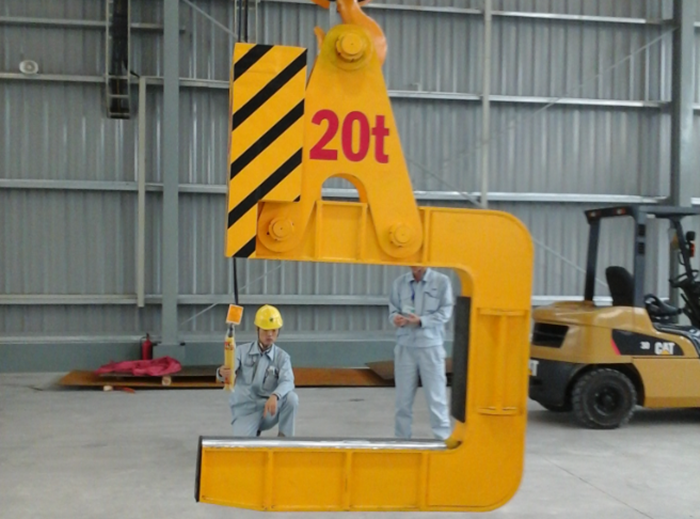
Tìm hiểu về những thông số đặc trưng của móc chữ C để có sự lựa chọn phù hợp
Tính ứng dụng của móc chữ C hiện nay
- Ngày nay nhu cầu xuất nhập khẩu hàng hóa tại các doanh nghiệp ngày càng tăng cao (lớn), đặc biệt các doanh nghiệp sản xuất, kinh doanh về sắt thép - Đây là nhóm mặt hàng có tải trọng nặng, cồng kềnh với kích thước lớn. Việc xếp dỡ, nâng/hạ những sản phẩm này lên các xe thùng hay container 20 feet - 40 feet không hề dễ dàng.
- Nếu chỉ sử dụng nhân công thì sẽ rất vất vả mà hiệu suất mang lại không cao. Ngoài ra, thời gian để setup và thực hiện một container hàng hoá có thể kéo dài và tiềm ẩn nhiều rủi ro về an toàn lao động.
- Các phương tiện khác như cẩu tự hành hay xe nâng chỉ hỗ trợ cho việc sắp xếp, tháo dỡ hàng hoá chứ không được sử dụng như một công cụ chính yếu trong hoạt động này (không hiệu quả), đặc biệt khi hàng hoá là những thanh thép dài đến 11.6m hay những bó tôn hộp, tôn tròn dài 6m, 8m, 10m.
- Vì vậy để có được một giải pháp tối ưu cho công việc này thì móc cẩu chữ "C" tải trọng 1.5 tấn dùng để nâng/hạ hàng hóa vào thùng container ra đời và ứng dụng khá phổ biến.
- Móc cẩu chữ "C" được đặt phía dưới móc cẩu cầu trục hoặc cổng trục (của thiết bị nâng hạ) ở nhà xưởng để thực hiện những công việc xếp dỡ trên.
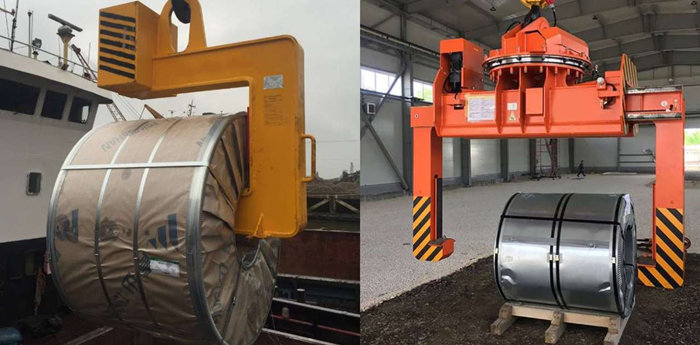
Tính ứng dụng của móc chữ C hiện nay
Lưu ý khi sử dụng móc chữ C
Cẩu móc chữ C có khả năng móc lớn, dễ dàng lắp ráp, khả năng cơ động cao và bảo trì thấp. Tuy nhiên, để đảm bảo độ bền cũng như hiệu suất làm việc của thiết bị, người dùng cần tìm hiểu và thực hiện theo các hướng dẫn sau:
- Chỉ móc hoặc nâng/hạ những vật có tải trọng trong khả năng của thiết bị.
- Khi đưa móc chữ C qua móc tải động cơ phải đảm bảo chắc chắn rằng nó đã được gắn chặt.
- Sử dụng chuỗi móc chắc chắn với chất lượng cao để móc tải của bạn.
- Sau khi hoàn thành công việc nên tháo rời và gấp thiết bị chính lại khi không sử dụng.
- Không sử dụng thiết bị để phục vụ cho bất kỳ mục đích nào khác.
- Bảo quản cẩu móc chữ C ở khu vực đúng quy định, hạn chế mài mòn.
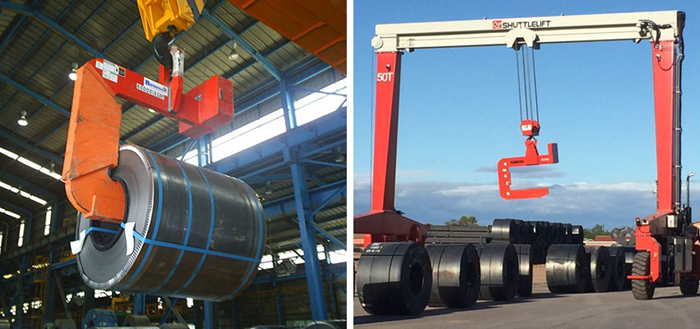
Qua bài viết, Cơ khí Sơn Tùng muốn chia sẻ một số thông tin hữu ích về thiết bị móc chữ C. Nếu quý bạn đọc có nhu cầu tìm hiểu kỹ hơn và cần được tư vấn chi tiết về móc chữ C, vui lòng để lại bình luận hoặc liên hệ ngay với Cơ khí Sơn Tùng để được hỗ trợ trong thời gian sớm nhất.







